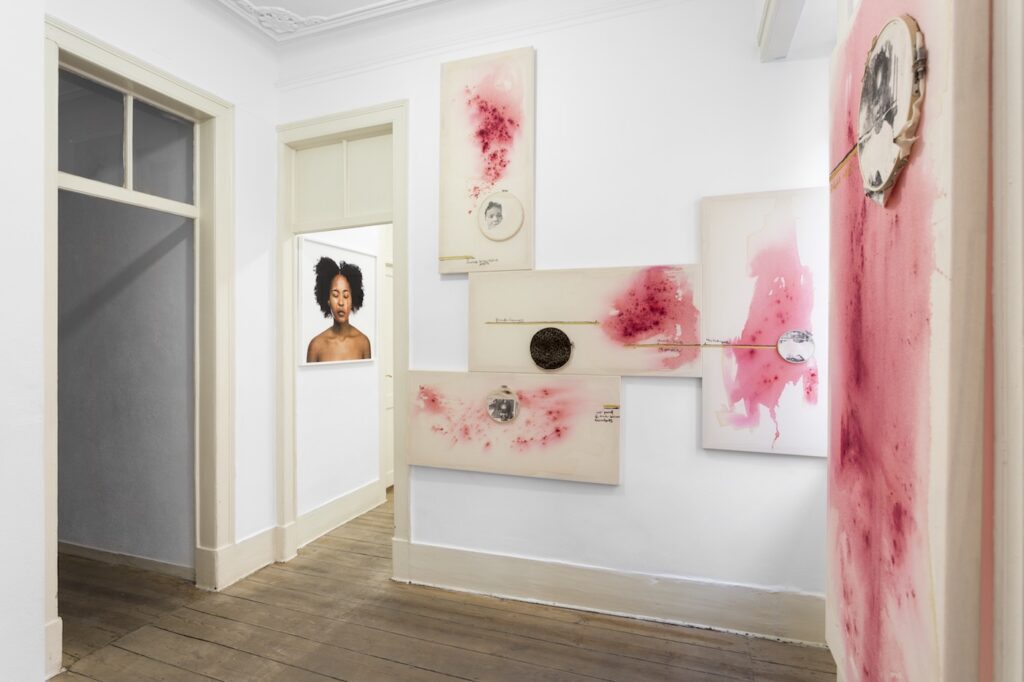Galeria Madragoa, Lisbon, Portugal
22 Mar 2019 - 04 May 2019

Installation view othunjiweyo by Buhlebezwe Siwani. Photo: Bruno Lopes. Courtesy of the artist and Madragoa, Lisbon.
Madragoa presents othunjiweyo, the second exhibition of Buhlebezwe Siwani at the gallery.
The show gathers a group of new works reflecting the autobiographical experience of the artist, who moved from South Africa to the Netherlands, where she is currently based. The title, othunjiweyo, comes from the Zulu word “ukuthunjwa” meaning one that is held hostage, kidnapped, and metaphorically expresses for the artist the feeling of uprooting, of dispossession experienced in a foreign country, on both levels physical and spiritual. The works presented in the exhibition stem from and convey this sense of physical distance, but at the same time they weave a bridge between these two dimensions, that are spatial as well as existential, through memory, gestures and rituals, connecting present and past.
Kumkanikazi is a mixed media installation consisting of found photographs portraying the artist’s female family members printed on fabric, wool, wood and a pigment obtained from medicinal plants from Southern Africa, where they are used to heal people. The objects and elements clustered on the canvas’s surface embody the activities and lives of Siwani’s family and ancestors depicted in the photographs, composing an abstract and choral portrait of the artist, that originates from a remote past, her deeper identity expressed by its constituent parts, as if they were particles of her DNA.
The abstract, invisible presence of Siwani inhabits the photographs from the series Inkomo zika Tata, shot in the South African countryside. Her figure has been physically erased from the landscape, a symbolic gesture that emphasises the personal separation from the family and native region, but also evokes a gender issue, women who have generally been erased from history, especially black women. In the photographs, to the dematerialised figure is superimposed the red umkhando, a substance used in prophetic healing and by traditional healers, which acts as a spiritual force.
The umkhando recurs in the series of four photographs, Dzumani, that evoke one of the stages of Siwani’s Sangoma initiation, in which a red substance named Dzumani (clay mixed with an oil), is poured onto the initiate’s hair, and drips onto their face. This series explores the idea of rebirth in a new place, the passage to a new phase in life.
Shot in the Netherlands is the series of photographs Mnguni, which, as always in Siwani’s work, is based on a performative act. The artist, dressed in various regalia that is of significance in the spiritual and cultural realm, invites the old people to take a seat on a bench in an uninhabited countryside. The foreign country reveals a familiar landscape and becomes the perfect setting for a ritual. Using a candle or imphepho, Siwani calls upon the ancestors to aid in this journey so that they may become one in new lands.
Buhlebezwe Siwani (Johannesburg, South Africa, 1987) completed her BAFA (Hons) at the Wits School of Arts in Johannesburg in 2011 and her MFA at the Michealis School of Fine Arts in 2015. She has exhibited at the Michaelis Galleries in Cape Town, a site-specific exhibition in collaboration with APEX Art, New York City, in 13th Avenue, Alexandra township, Commune 1, and Stevenson in Cape Town. More recent exhibitions include the Kalmar Art Museum in Sweden, The Louis Vuitton Foundation in Paris, and the Bienal de Coimbra 2017, Portugal, KaDE Museum, Amsefoort and Twill Art Studios, Johannesburg. The collective iQhiya, of which Buhlebezwe Siwani is part, participated in Documenta 14, 2017.